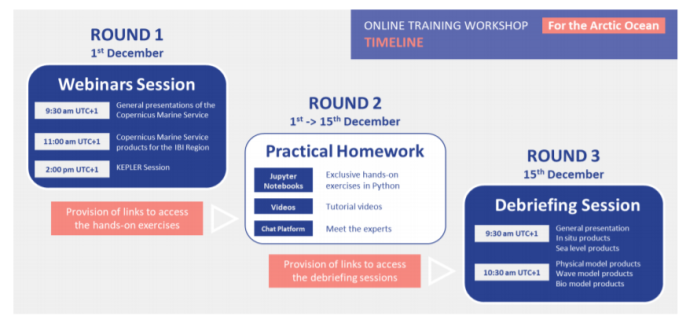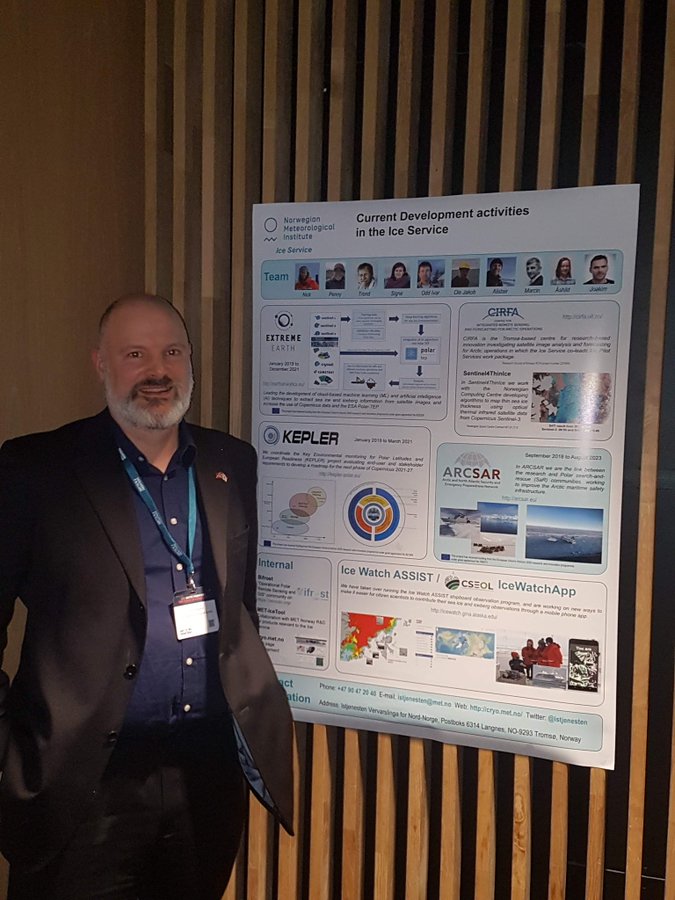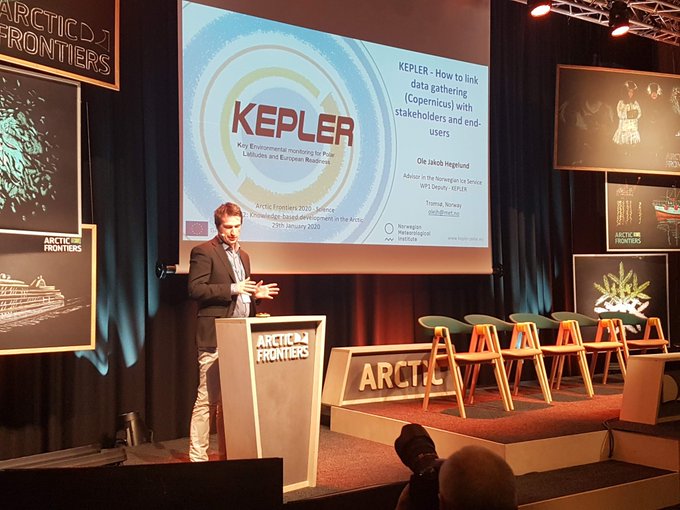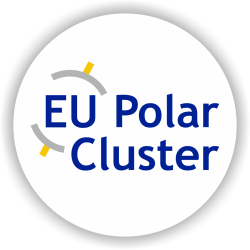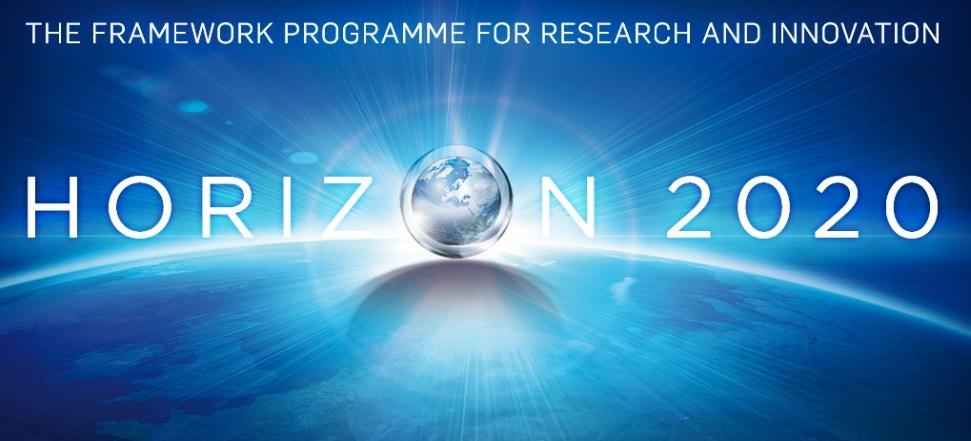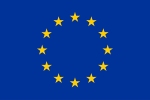KEPLER’s Best Practice Guide
KEPLER have produced a Best practice guide for Earth Observation information use by research vessels and stations. The aim of this is to ensure researchers that participate in science performed
from research stations (such as those within the EU INTERACT network) or ice-strengthened research vessels (such as those within the EU ARICE network) have the tools at their disposal to ensure that they are using best practice when accessing EO data whilst in the field.
To do this we have captured the knowledge of experienced users to ensure we have a better understanding of the challenges involved, but more importantly we provide a route to overcome these challenges so that we ensure the latest EO data are regularly retrieved and used by scientific field parties right across the Arctic.
Our hope is that this will lead to an increased up-take of EO data and products, thus providing enhanced and timely knowledge of the Arctic Environment. By doing so, the safety for Arctic operations is improved, and we ensure knowledge-based decisions are made that benefit both the scientists and the operators of the vessels and stations.
Use the links below to read/download KEPLER’s Best Practice Guide
KEPLER’s Roadmap
KEPLER’s aim was to provide a clear, concise and achievable road map for the Copernicus programme to develop industry and societal-driven value-added technologies, products, and other services.
After 2½ years investigation into end user and stakeholder information requirements for the Polar Regions, the KEPLER project reached its conclusions on how Copernicus should proceed during the period 2022-28.
KEPLER’s end-to-end operational system Roadmap is based on a comprehensive review of the user requirements, current planning, and analysis of the existing research and capacity gaps.
Use the links below to read/download KEPLER’s Roadmap Towards a European End-To-End Operational System for Monitoring and Forecasting of the Polar Regions.
KEPLER’s Final Newsletter
The latest and final KEPLER newsletter- summarising Summer 2021’s activity is now available to view below.

This edition includes a recap of all KEPLER activities up to the end of the project, highlights from the Final General Assembly, the Review meeting and links to all deliverables and end of project dissemination activities. This also include links to digital versions of the final project brochures, as well as KEPLER conclusions and a closing statement from project co-ordinator, Nick Hughes.
To view previous editions, check out our newsletter archive here.
KEPLER @ ESA POLAR CLUSTER 21
End of project dissemination continues for KEPLER – this week, project Co-ordinator Nick Hughes presented KEPLER project highlights and main achievements at ESA’S Polar Science Cluster Collocation Meeting.
For more information check on ESA’s website below:
The purpose of this meeting is to review the latest developments and results of the different projects, present the new projects recently kicked off and discuss with you the potential scientific priorities for the future.
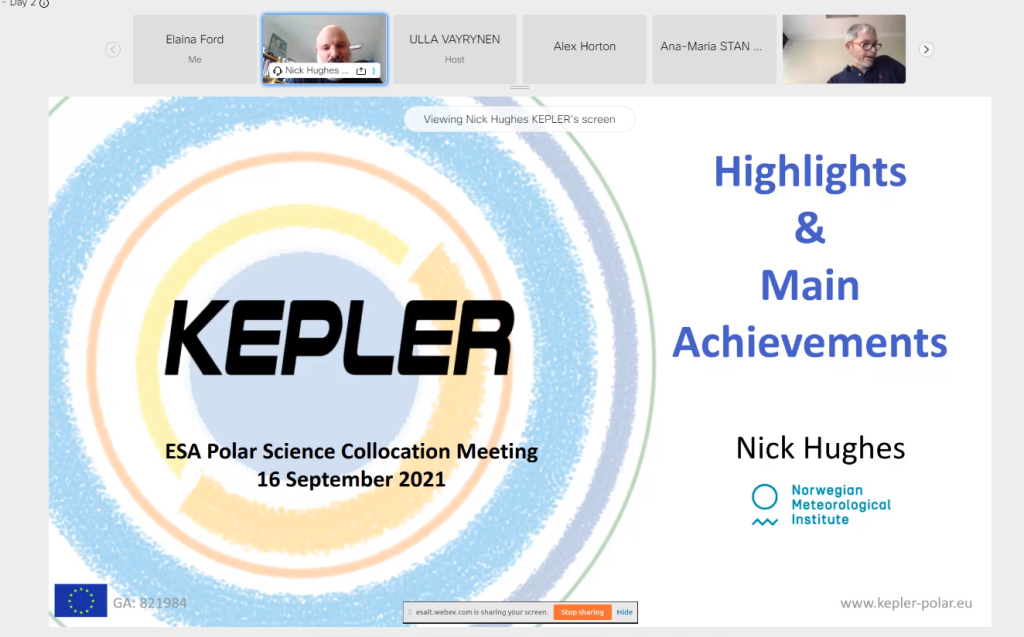
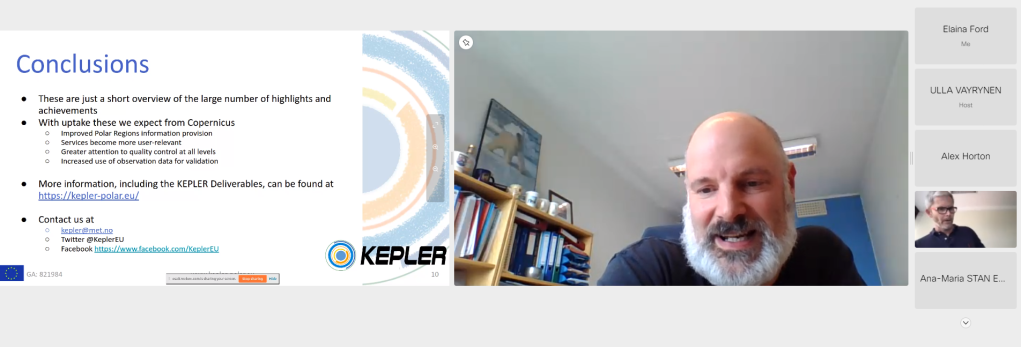
Thanks from KEPLER
As we wrap up the KEPLER project, the team would like to thank all participants in the project, both project members and those that have input to workshops and questionnaires and all other activities – we’re grateful for your efforts, which have contributed to the deliverables and milestones, and a successful review.
In particular we wish to thank the WP leaders for pulling all the work together, in the deliverables, the dissemination outputs (see resources tab), and the draft periodic review report and final report.
Special thanks go to the Reviewer, and our two project officers from the EC, and colleagues from DG Grow, who have all read through the reports and outputs, and given input and support.
We won’t be leaving things there though, we hope to continue to disseminate our results over the coming months at events and conferences. We will also continue the legacy of KEPLER and collaborations and networks built, through the EU Polar Cluster.
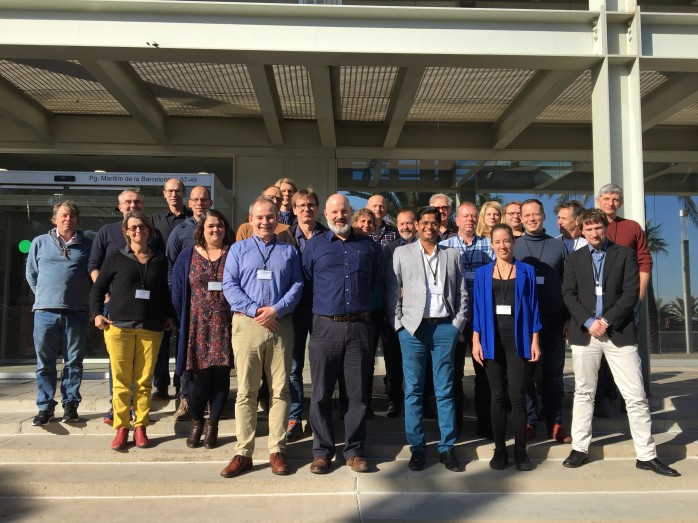
Arctic Stakeholder Map
The KEPLER Interactive Stakeholder Map is an exploratory application, developed during the KEPLER project. The map provides an overview of Arctic activities and linkages to the European Union’s Copernicus programme.
The platform is now live, check it out at map.kepler-polar.eu – a direct link is also available via the menu above.
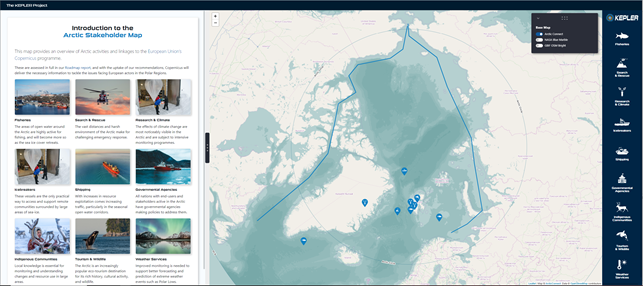
The Arctic Stakeholder Map database contains stakeholder interests from KEPLER, Copernicus and other relevant data streams*. The development of an Application Programming Interface allows users to access and display data in a visual map format, and view links to direct data sources for a more in-depth search.
*i.e. Fisheries, Search and Rescue, Research and Climate, Arctic shipping- including Icebreaker vessels, Government Agencies, Indigenous Communities, Tourism/Wildlife and Operational Weather Services.
Development and input of the map is ongoing, administrators continue to modify and add new items, external resources and CSV data. We hope that this map will be a legacy of the KEPLER project and plan for this platform to be utilised through other projects such as Arctic PASSION, and maintained by the EU Polar Cluster.
Further information about Arctic activities and linkages to the EU Copernicus programme can be found in the KEPLER Roadmap. The recommendations within the KEPLER roadmap aim inform the next phase of the Copernicus programme, aiming to improve information services, and tackle the issues facing users in polar regions.
We would love to hear your feedback about this new platform- you can get in touch via the contact button on the menu above.
KEPLER Video
As the KEPLER project wraps up, we have produced a video to highlight how KEPLER’s recommendations can inform the next phase of the Copernicus programme, aiming to improve information services for users in polar regions.
The full length version of the KEPLER video is now available to view and download here:
KEPLER Conclusions
After 2½ years investigation into end user and stakeholder information requirements for the Polar Regions, the KEPLER project has now reached its conclusions on how Copernicus should proceed during the period 2022-28. This includes an end-to-end operational system Roadmap based on a comprehensive review of the user requirements, current planning, and analysis of the existing research and capacity gaps.
Key findings from KEPLER are that existing, long-held, user requirements have not been appropriately addressed, and that there is scope for future improvement to intensify user uptake. These improvements could be delivered with new satellite Earth Observing capabilities, such as the Copernicus Expansion Missions, coming online in the later half of the decade.
There is a requirement for greater inclusion and support for in situ monitoring efforts, including Citizen Science initiatives. This would provide a greater sense of ‘ownership’ of Copernicus by European citizens. Greater focus must also be placed on utilising the many resources, both inside and outside of Copernicus, to provide stronger oversight and quality assurance of data products and information. By doing so, Copernicus will ensure that these products are relevant and fit-for-purpose, informing decisions both today and in the future. This will promote the accelerated uptake of new research and technological developments coming out of Horizon Europe. Additionally, KEPLER identified that terminologies within Copernicus differ from internationally accepted practise, which can cause confusion and impede users from effectively communicating their requirements.
The Roadmap addresses the above mentioned challenges, moving us towards a comprehensive European end-to-end operational system, by improving design aspects such as the set of required observations, and the potential inclusion of prior information to better constrain sparsely observed areas/variables. It suggests strategies to close gaps in our current forecasting capabilities, and ways to develop and sustain the observing system.
With the uptake of our recommendations, as described in full in our Roadmap report, KEPLER is confident that the Copernicus monitoring system for Earth will deliver the necessary information to tackle the issues facing European actors in the Polar Regions. This includes in-situ and satellite components, data handling capabilities, forecast and reanalysis modelling systems, and dissemination procedures. Copernicus support will meet the varied needs of climate change monitoring and prediction, waste/pollution management, and safe and efficient navigation in ice infested waters, and facilitate the shift towards a low carbon economy. The roadmap towards a European end-to-end operational system addresses the design aspects and recommends strategies to close gaps in our current capabilities, along with ways to evolve and sustain the observing system.
Keep an eye on our website and social media, where we will post a recap on KEPLER’s key reports and project highlights over the next few weeks. We also plan to disseminate results at events and conferences in upcoming months. For access to all project deliverables, reports, training sessions and more, click the button below to check out our resources page…
KEPLER Final Review
The Final Review Meeting for KEPLER was held on Tuesday 13 July 09:00-13:00 BST
The KEPLER Management Board (KMB) presented project results to the European Commission and the external reviewer.
The KEPLER team were thrilled to receive a positive assessment of the project output, and have finalised the actions based on project review results, and we have submitted a reply to the Commission.
We wish to thank all participants in the project, both project members and those that have input to workshops and questionnaires and all other activities – we’re grateful for your efforts, which have contributed to the deliverables and milestones, and a successful review.
In particular we wish to thank the WP leaders for pulling all the work together, in the deliverables, the dissemination outputs (see resources tab), and the draft periodic review report.
Special thanks go to the Reviewer, and our two project officers from the EC, and colleagues from DG Grow, who have all read through the reports and outputs, and given input and support.
We are now working on the final reporting requirements for the EC over the rest of the summer. We won’t be leaving things there though, we hope to continue to disseminate our results over the coming months at events and conferences.
We will also continue the legacy of KEPLER and collaborations and networks built, through the EU Polar Cluster.
KEPLER Video
Sámi subtitled version:
KEPLER Final General Assembly
The third and final KEPLER GA took place on 21st-22nd June 2021. Day 1 kicked off with a welcome and introduction from Nick Hughes, Project Co-ordinator. Day 1 also focused on work packages 1-5, with overview presentations on each subtask and plenty of time for questions and discussions. Participants were also invited to view some of the WP6 dissemination activities such as the KEPLER video and brochures.
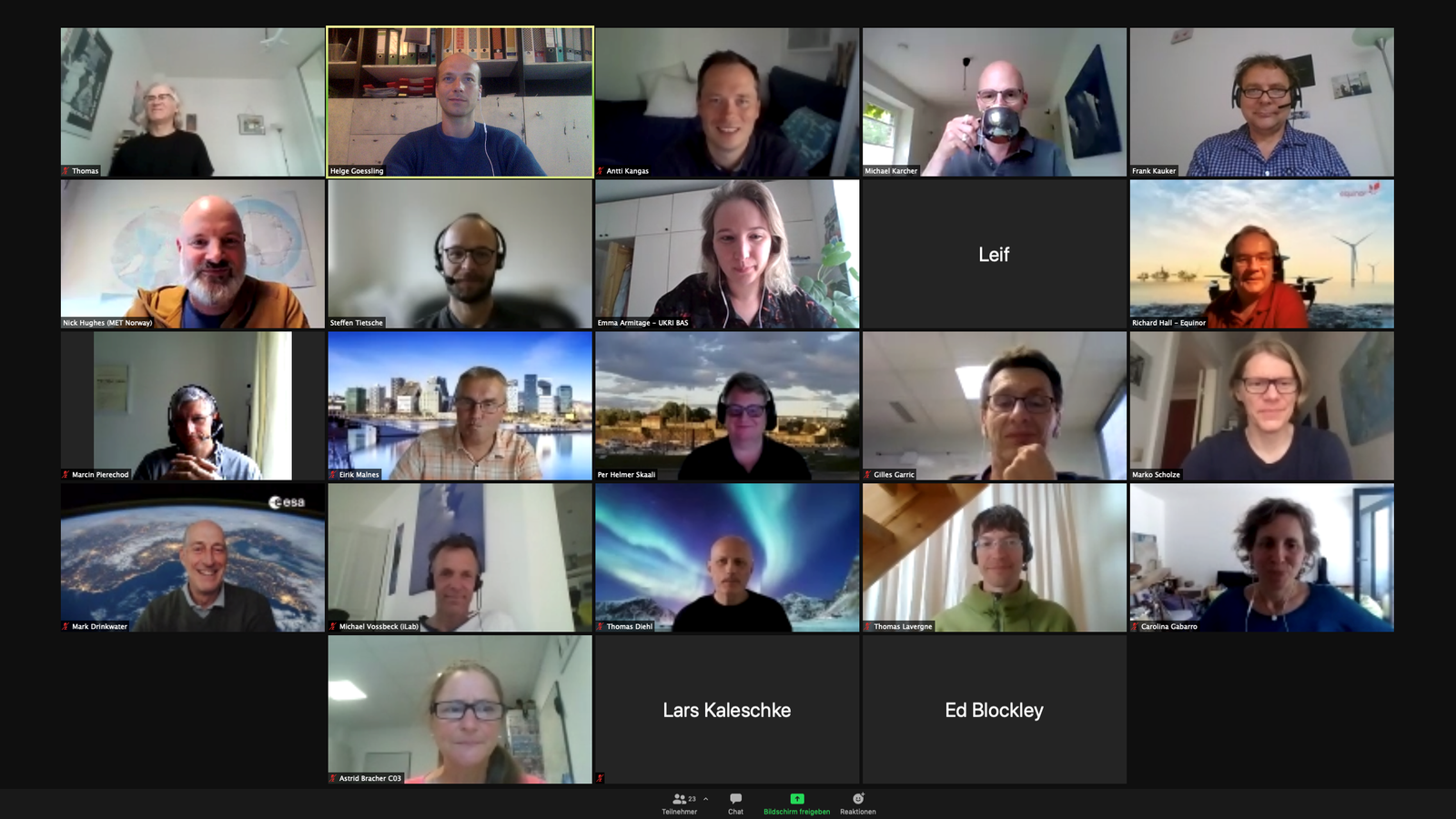
Work Package leaders presented results from each work package team, highlighting key deliverables and events. Day 2 was an internal project meeting, to review feedback and collate actions for submission of final deliverables. The KEPLER team would like to extend our thanks to all the speakers and attendees that made this final meeting a success.
The full report of the Final General Assembly (Deliverable Report 7.4) is available to view via the link below:
KEPLER Online Round Table
The KEPLER project is seeking feedback from those working with offshore and coastal engineering in Polar Regions.
The project has prepared a number of recommendations as to how the European Copernicus programme can evolve to better serve the needs of users in the Polar Regions, and the purpose of this questionnaire is to find out whether you think that these are appropriate for your use cases, or whether they require further work.

The KEPLER Online round table: Engineering & Researcher information requirements consists of a short pre recorded video by Nick Hughes- (Project Coordinator and Ice Services leader at the Norwegian Meteorological Institute) and ten questions.
Please provide your feedback here:
Participate in the KEPLER Online Round Table- Engineering & Researcher Information Requirements
Registration for the Final General Assembly
Monday 21st June 2021
09:00 – 15:30 BST
Zoom
Please could you register using the link below. Once registered, we will send you the joining instructions.
KEPLER Final GA – Registration
Version 3 of the programme is available to view now, we have structured this to include plenty of discussion time/breaks. Please note that timings and speakers may change.
All welcome.
KEPLER Workshop – Maritime and Research sector needs
KEPLER are hosting an online workshop on Maritime and Research Sector Needs as part of our work to develop a roadmap for further development of the European Copernicus Earth Observing programme specific to the Polar Regions.
In this workshop we will present our recommendations, and ask for feedback, with a focus on the maritime and research communities. This is an open workshop- we welcome you to join us!
Wednesday 19th May 2021 (13:30- 17:00CET) (12:30- 16:00 BST)
Please Register here for the event.
The full agenda is available to view here:
KEPLER Workshop – Maritime and Research sector needs
NB timings in CEST
Identification of research and capacity gaps
The additional deliverable: D3.5: Executive summary of identification of research and capacity gaps- is now available to view.
This report consists of 6 parts: Objectives of WP3, Executive Summary of Task 3.1, Executive Summary of Task 3.2, Executive Summary of Task 3.3, Executive Summary of Task 3.4 and Conclusions and Recommendations from Work Package 3.
Click the button below to find links to all available KEPLER deliverables:
PEG-3 report
The New Copernicus Polar Expert Group report has been published. The latest report – ‘User Requirements for a Copernicus Polar Observing System– Phase 3 Report – Towards Operational Products and Services’ – references the ongoing work within KEPLER, and is now available to view and download via the Copernicus website, along with previous reports.
https://www.copernicus.eu/en/news/news/new-copernicus-polar-expert-group-report-published
KEPLER Workshop @ ASSW2021
The agenda for KEPLER’s ASSW workshop:
‘Enhancing Copernicus 2.0 information products through optimised usage of in-situ data’
Is now available to view here: ASSW KEPLER workshop v.03
ASSW participants, join us on: Saturday 20th March, 15:30-18:30 GMT
This Community Workshop brings together nationally and internationally recognised Earth Observation and in-situ monitoring Arctic experts, an aims to identify how we can better coordinate, integrate, and share in-situ observational data in order to enhance the products offered by the Copernicus Services.
For more details and to register click here: ASSW2021: Detailed Programme
KEPLER @ASSW 2021
The KEPLER project will participate in this years’ Arctic Science Summit Week virtually!
We are hosting a community workshop on Saturday 20th March, 15:30-18:30 GMT
‘Enhancing Copernicus 2.0 information products through optimised usage of in-situ data’
This Community Workshop brings together nationally and internationally recognised Earth Observation and in-situ monitoring Arctic experts, an aims to identify how we can better coordinate, integrate, and share in-situ observational data in order to enhance the products offered by the Copernicus Services.
For more details click here: ASSW2021: Detailed Programme
***An agenda for this event will be released later this week***
KEPLER Amendment
KEPLER has received confirmation that the project amendment has been approved by the European Commission. This will will permit further work on deliverables and events disrupted by COVID-19. We are now scheduled to complete the project in June 2021, extending our total project time to 30 months.
Included in the KEPLER project amendment is the addition of an extra milestone:
M27 (M5.4) Key draft outputs for D5.2 Roadmap for end-to-end operational system for monitoring and forecasting the Arctic – Presentation slides for stakeholder use- outlining key draft outputs for deliverable D5.2
We have also identified the need for an extra deliverable to WP3:
D3.5: Executive summary of identification of research and capacity gaps- drawing together data from all WP3 deliverables into one report.
Over 80% of the KEPLER project milestones and deliverables have now been delivered! (pending approval.)
KEPLER ECR workshop
KEPLERs online workshop for students and early career researchers was being held 17-18th February 2021.
Both days 1 & 2 of the KEPLER online ECR workshop are now completed and recorded, together with the training sessions in Python libraries and QGIS visualization.
Thank you to all those involved in the organisation of this workshop, and those who have participated.
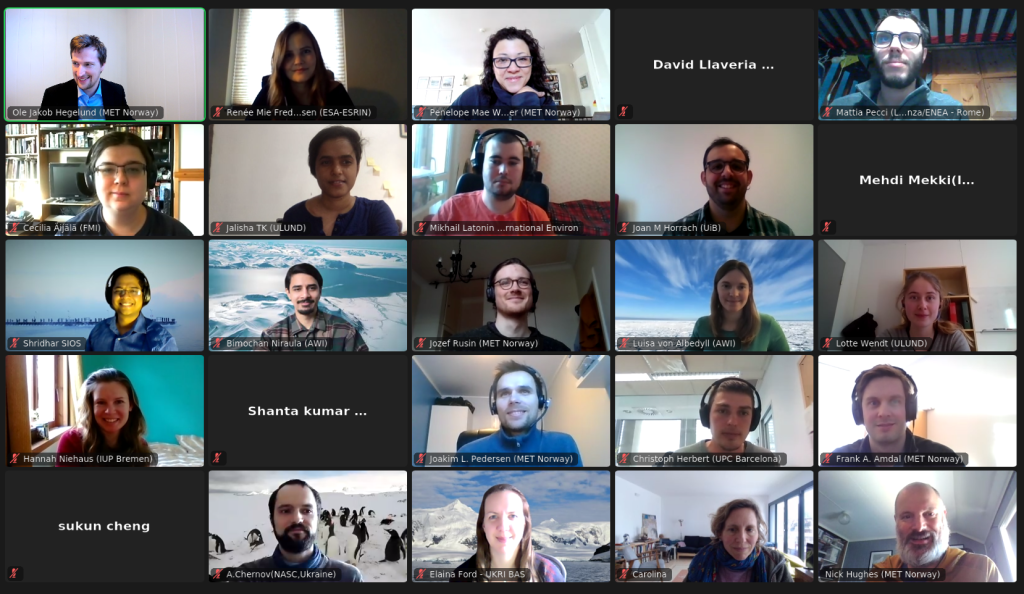
Below you will find links to the recordings from both days;
Day 1
Day 2
ECR Training sessions:
Training session in Jupyter Notebooks
Training session in QGIS
The full agenda is available to view below:
This online workshop was open for students and Early Career Researchers within Earth Observation and who use data from Polar Regions.
kepler ONLINE WORKSHOP FOR EARLY CAREER SCIENTISTS (17-18TH FEBRUARY 2021)
SAVE THE DATE!
We are pleased to announce that we will host a KEPLER online workshop for students and early career scientists 17-18th February.This online workshop is open for students and early career scientists within Earth Observation and who use data from Polar Regions. We will have social networking sessions, student presentations, and training sessions. Get the chance to meet KEPLER representatives and from
EU Copernicus Services.
Click here for REGISTRATION
COPERNICUS Marine Service Training Workshop for the Arctic Ocean
Both Rounds 1 & 2 of the Copernicus Marine Service Training workshop for the Arctic Ocean are now complete, with the debriefing session due to be held tomorrow morning at 09:30 UTC+1
Thankyou to all those involved in the organisation of this workshop, and those who have participated so far. The webinar session in Round 1 was recorded and available to view below:
KEPLER Survey – Early Career scientist workshop
We are pleased to announce that KEPLER is planning to host an Early Career Scientist Online Workshop for students and early career scientist in tentatively Mid-February 2021. To help us out forming the workshop and chose the topics, we would be grateful if you took the time to fill out this survey.
The full agenda and registration will be sent out in Mid-January 2021.
Please share the news with your students and early career scientists.
COPERNICUS MARINE SERVICE TRAINING WORKSHOP FOR THE ARCTIC OCEAN
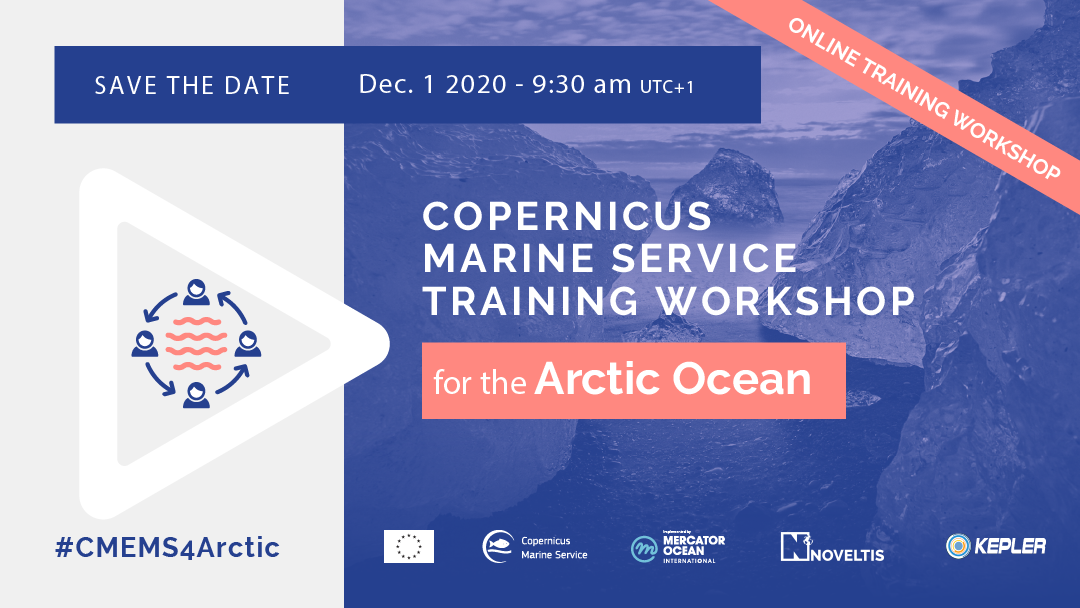
Mercator Ocean international, Noveltis and KEPLER are organizing the Copernicus Marine Service Online Training Workshop dedicated to the Arctic Ocean on December 01 2020 – 9:30 am UTC+1.
The online Copernicus Marine Training sessions have been designed to train existing as well as new Copernicus Marine Service users. The audience will learn about the use of the Copernicus Marine Service products and services and their possible applications.
The acquisition of knowledge during the workshop will allow the public to
- Interact and share their experience.
- Participate in the improvement of the Copernicus Marine Service portfolio by expressing their needs and requirements.
Copernicus marine products are open-access and free for all to use.
The agenda is available to view here and registration is now open. Click here for further information.
Recommendations for Improved Sea Ice ECV records
The KEPLER team have successfully submitted Deliverable 4.2 to the European Commission for approval.
This public report is a key outcome of the KEPLER project and specifically investigates the Sea Ice Essential Climate Variable (ECV), focusing on Climate Data Records (CDRs) and Climate information for the sea-ice Essential Climate Variable (ECV). It is noteworthy that D4.2 builds upon the Stakeholders and Users Requirements collected in WP1, the inventory of the CMEMS multi-year products (both reanalysis and satellite-based products), and the gaps identified there.
This report covers several aspects, such as:
- Introduce the WMO GCOS ECVs, and the Sea Ice ECV in particular.
- Report on the current implementation of the Sea Ice ECV in Europe.
- Outline ways to better serve the Sea Ice ECV from Europe (recommendations)- including consultation of the community of sea ice climate data-records producers.
Read the report below
Recommendations for improved sea ice ECV records *pending approval*
Lead Author: Thomas Lavergne (Met Norway)
Contributing Authors: Steffen Tietsche (ECMWF), Helge Goessling (AWI), Laurent Bertino (NERSC) and Gilles Garric (Mercator Ocean International.)
*Please note this document is pending approval from the EC
KEPLER Newsletter Summer 2020
KEPLER Review Report
The KEPLER Project Review was completed in August 2020 and the EC review report has been distributed to work package leaders. We are now working on implementing the report recommendations and expert opinions.
We have received positive feedback and constructive advice for going forward with the project:
‘There looks to be good cohesion between the work packages in KEPLER with partners working together well on cross-WP, interdisciplinary activities.’
Alongside the review report, KEPLER has applied for an amendment to the project to extend the overall project length to 30 months. This 3 months extension will permit further work on deliverables and events disrupted by COVID-19. This amendment also includes the addition of a new milestone-
Milestone 27 (M5.4) Key draft outputs for Deliverable 5.2. Roadmap for end-to-end operational system for monitoring and forecasting the Arctic – creation of presentation slides for stakeholder use.
These are not yet finalised until the amendment has been submitted and approved. We will keep you posted. Any other changes required please contact the relevant WP leader in the first instance.
Deliverables available for download
We have uploaded our submitted deliverables which you can download from
Some deliverables were not intended to be publicly available, however we have uploaded a good number of these. If you have questions about the others (if there is no link then they’re submitted to the EC but not uploaded here) then please contact us
kepler @ ASSW/aos
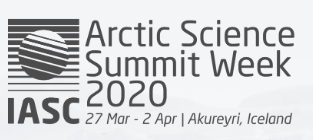
We had to cancel/postpone our open town-hall meeting at the Arctic Science Summit Week (ASSW) due to the ongoing COVID-19 pandemic. ASSW is the premier Arctic science event organised by the International Arctic Science Committee (IASC), and it runs every year. Being both a political and science based meeting it is the ideal platform to perform two-way dialogue with key stakeholders, and thus will reschedule for ASSW2021.
We also planned to run a community workshop at the 5th Arctic Observing summit (AOS) held during ASSW. This workshop would bring together nationally and internationally recognised Earth Observation and in-situ monitoring Arctic experts, with an aim to strengthen the calibration and validation of remotely sensed products, and forecast model data assimilation within Copernicus.
Our submitted abstract is available to view here, we hope to follow this up next year.
YOPP Science Workshop 2020
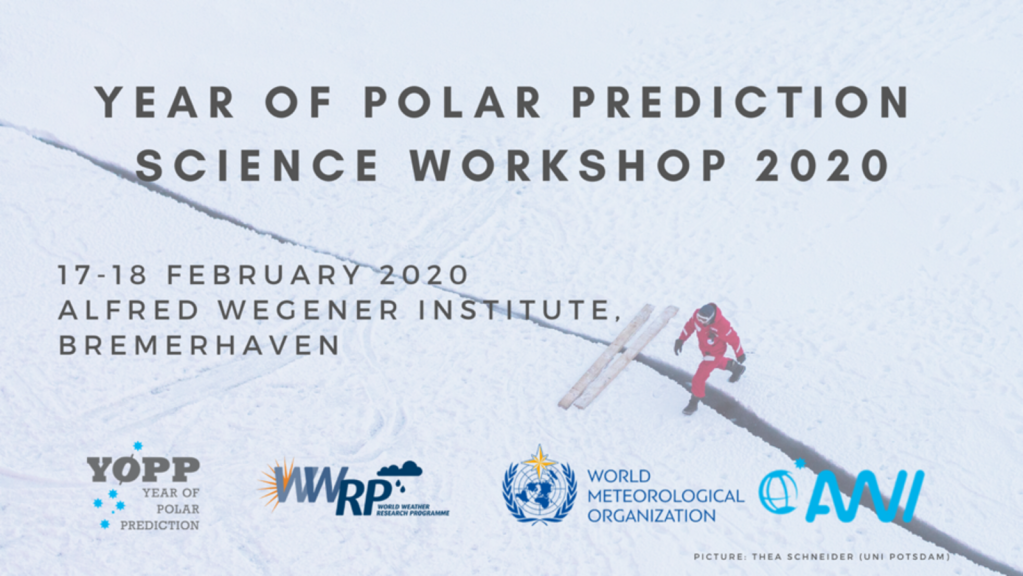
Photo: Thea Schneider (University of Potsdam)
KEPLER participated to the YOPP Science workshop, held at the Alfred Wegener Institute in Bremerhaven, Germany, 17th-18th February 2020.
Frank Kauker, work package 5 leader, presented the work undertaken so far towards deliverable 3.4- The final report on research gaps in terms of integration/assimilation of space-based and in situ observations to fill in order to improve Polar Regions monitoring and forecasting capabilities.
Click the link below to read more about this workshop at the Polar Prediction Project website
ARCTIC FRONTIERS 2020
Nick Hughes from Norway’s ice service, with the poster for @arcticfrontiers presenting a summary of current development activities in @KeplerEU, @ExtremeEarth_EU, @ARCSARNETWORK, @CIRFA_SFI, and @IceWatchASSIST@CSEOLab IceWatchApp
Ole Jakob Hegelund from @Meteorologisk@Istjenesten presenting WP1 user requirements for an improved @CopernicusEU to monitor the #polar regions @arcticfrontiers
Thank you to all those who joined us on Tuesday for KEPLER’s interactive live streamed side event- “Evolving the @CopernicusEU programme for the Polar Regions” #Tromsø, #Norway
KEPLER at Arctic Frontiers 2020, 26-30 January, Tromso, Norway
KEPLER @ ARCTIC FRONTIERS
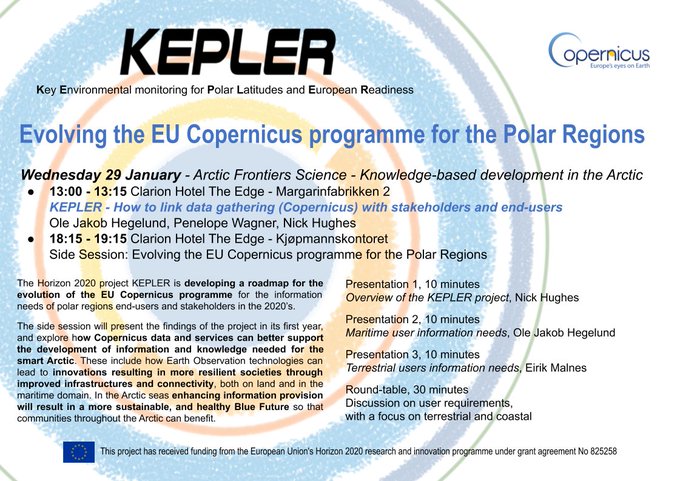
We would like to invite all to our interactive side event @arcticfrontiers 2020 “Evolving the @CopernicusEU programme for the Polar Regions”. We will be streaming live from the meeting in #Tromsø, #Norway
29 January 18:15-19:15 CET. More info and registration at https://eu.eventscloud.com/website/614/sents/
MID TERM MEETING BARCELONA
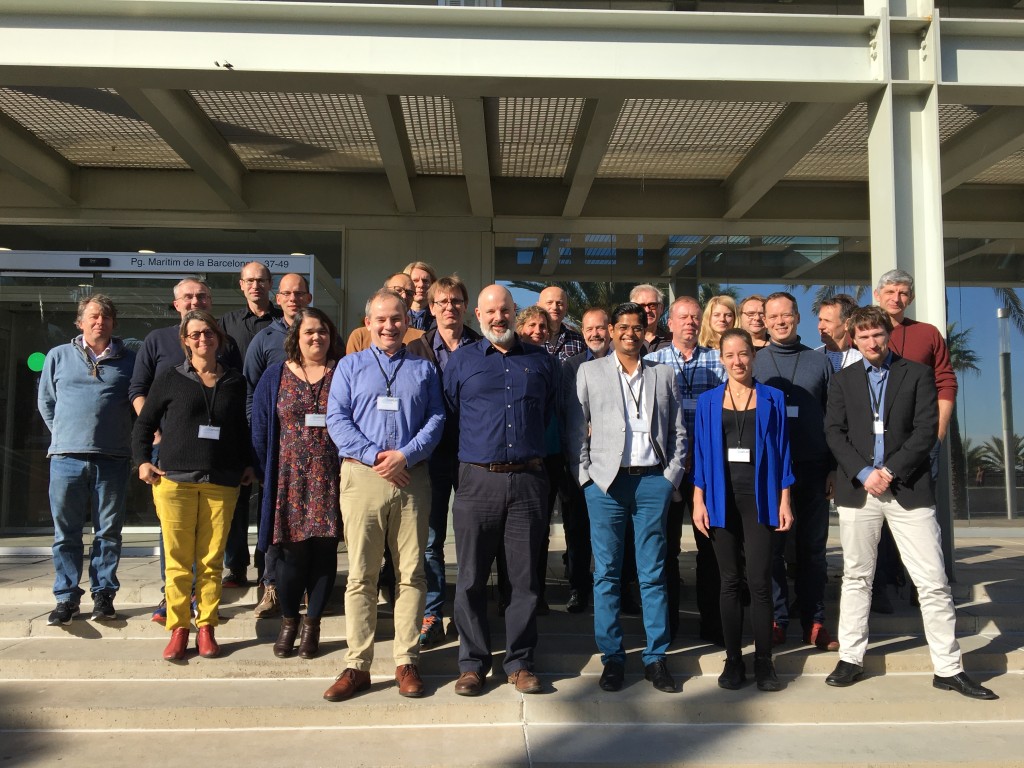
KEPLER held a General Assembly meeting @ICMCSIC in #Barcelona with overviews of our progress in the past 11 months and introductions to other @EU_H2020 #polar projects @IntarosProject, @ExtremeEarth_EU and @ARCSARnetwork. This meeting gave us the opportunity to discuss progress in each work package and the status of @CMEMS_EU and @CopernicusLand, and make plans for upcoming project work over the next year.
KEPLER Mid term meeting, 25-28 November 2019, ICM CSIC Barcelona, Spain.
Arctic Circle 2019
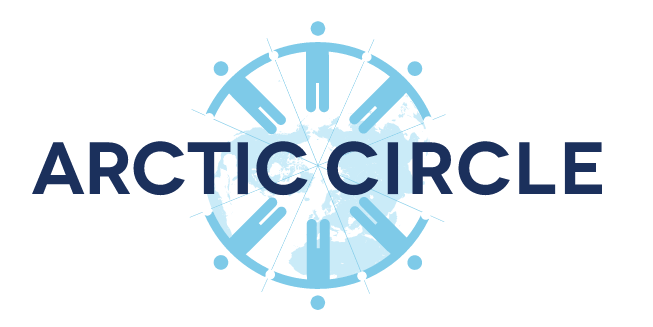
Join us at the Arctic Circle Assembly in Reykjavik for an EU Polar cluster session:
“Breaking the ice: Cooperation for safe and responsible exploitation of Arctic sea routes”
17:00-18:30, Friday 11th October 2019
Organised by the EU Polar Cluster members ARICE, KEPLER, ARCSAR, with ExtremeEarth. Full details on this side session are available to view here:
Eu-polar-cluster-session-for-arctic-circle-assembly-2019
The Arctic Circle Assembly 2019 Harpa Concert Hall and Conference Center, Reykjavik. October 10-13, 2019.
IS-ENES3 workshop
User-relevant forecasts with sea-ice models
Work Package 4 leader, Steffen Tietsch, gave a keynote presentation in September at the workshop “The future of sea-ice modelling”, funded by IS-ENES3 and held in Iceland.
Presenting “User-relevant forecasts with sea-ice models” provided the opportunity to introduce the KEPLER project and present outcomes and share lessons learnt.
Kepler at the IS-ENES3 workshop, 24-26 September, Laugarvatn, Iceland
KEPLER at IICWG-DA

KEPLER participated in the IICWG-DA joint workshop held in Bremen, Germany, with the International Ice Charting Working Group (IICWG), the Year of Polar Prediction (YOPP by the World Weather Research Programme (WWRP)), and GODAE Oceanview (GOV.).
KEPLER activities included:
A presentation by Nick Hughes (METNO) providing an overview of the KEPLER project. Key Environmental monitoring for Polar Latitudes and European Readiness,
Quantitative Network Design Analyses of Observational Scenarios within KEPLER, Thomas Kaminski (iLAB)
KEPLER Questionnaire, Helge Goessling (AWI), Steffen Tietsche (AWI)
Source: Alfred Wegener Institut 2019
You can find more information about this event via the Alfred Wegener Institut website here.
KEPLER Newsletter
The first issue of the KEPLER newsletter for Spring/Summer 2019 is available to view here. To receive the latest news and events from KEPLER sign up to our mailing list by clicking the image below.
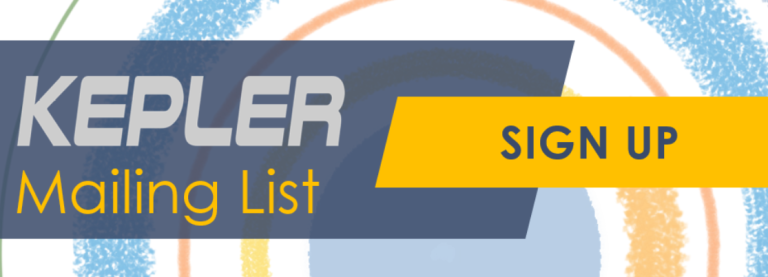
If you would like to get involved by sending us information about your KEPLER event, or submit an article, please get in touch via email: emmarm@bas.ac.uk
Arctic Shipping Forum
Our project partners from England, Norway and Finland represented KEPLER & the EU Arctic Cluster at the the 15th annual Arctic Shipping Forum in Helsinki.
Participants at ASF were welcomed to find out more about the project at the KEPLER booth and Penny Wagner (METNo), Sea Ice Researcher and KEPLER work package leader, presented an interactive discussion panel asking ‘How can collaboration be implemented to improve Maritime domain awareness?’
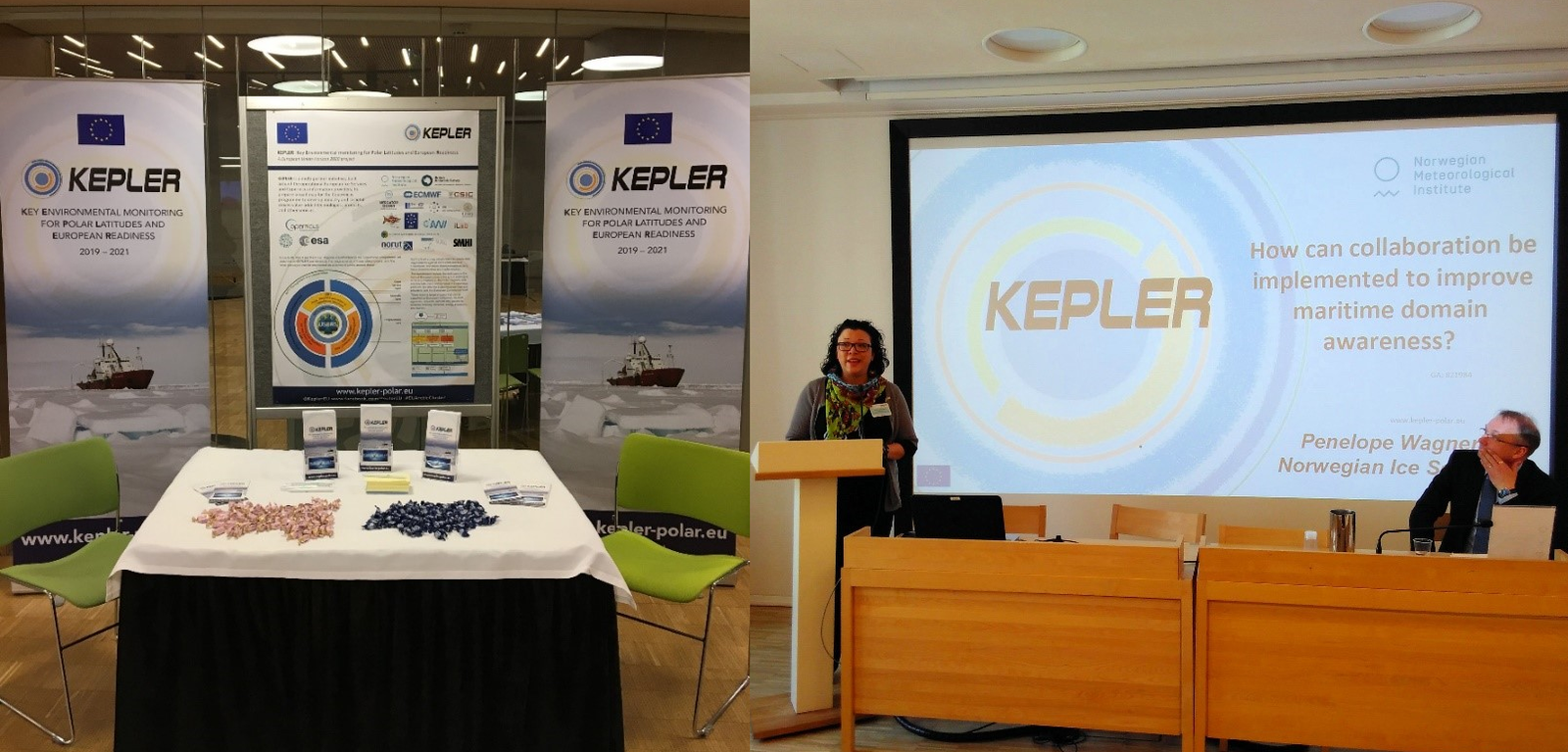
As user needs are at the centre of the KEPLER project, our focus for this event was to open up a direct dialogue with the maritime community- seeking end user requirements for sea ice and forecasting needs.
Four key questions were on display during the event;
- What would be the most useful sea ice and icebergs parameter to have, that is currently unavailable to you?
- What do you see as the status of Arctic shipping in 10 years? I.e. new routes, timeline of shipping season, regulatory requirements, weather and ice information needs… etc.
- Low spatial resolution hemispheric coverage or high spatial resolution regional coverage. Which is more useful to you and when?
- Do you use forecasts? If so, what time range of sea ice forecasts are useful to you?
If you would like to participate and answer the questions above, you can also submit your feedback here: Submit Maritime Feedback
This feedback will be combined with stakeholder responses from various activities carried out over the life of the project, and will help inform the recommendations we make to Copernicus for polar region monitoring.
KEPLER
KEPLER is a multi-partner initiative, built around the operational European Ice Services and Copernicus information providers, to prepare a roadmap for Copernicus to deliver an improved European capacity for monitoring and forecasting the Polar Regions.
Our motivation is to put the public and stakeholders at the centre of Copernicus. This follows the recommendations of the ‘Copernicus User Uptake’ review, and its 4 themes of:
- Raising awareness for the Copernicus programme,
- Informing and educating Copernicus users,
- Engaging Copernicus users in public and private sector, and
- Enabling access to Copernicus data and information.
These well tailored themes form the core components of KEPLER. However, as the Polar Regions are changing, so too are the challenges and opportunities. Because of these shifts we have included two additional themes that encompass the evolving needs. These are needed to provide opportunities for better understanding the environment, research opportunities, establishing new industry sectors and startups, and importantly empowering citizens:
- Identification of research gaps regarding integration/assimilation, and
- Improved sea-ice mapping and forecasting.
Through these 6 themes KEPLER aims to release the full potential of Polar Regions Earth Observation, including from ESA and EUMETSAT, by identifying and eliminating the barriers that impede the use of the tremendous resource that is Copernicus. This
combines 2 key elements of the call:
a) bringing together key European stakeholders and competent entities, and
b) growing the Copernicus brand and user-base through providing enhanced scientific and technical support.
Our objective with KEPLER is to provide a mechanism that enables the broad range of Polar Regions stakeholders to be equipped with the most accurate and relevant environmental information so that they can seize the many benefits that Copernicus products generate for society and economy.



